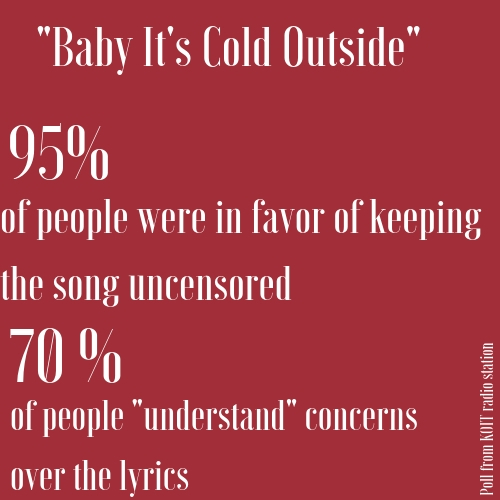‘Baby, It’s Cold Outside’ should not be altered
As the holiday season begins, Christmas lights go up, cars drive around town with a tree tied to their roof and holiday classics seem to be on repeat. One song you may encounter this year is “Baby, It’s Cold Outside” by Frank Loesser, which is accompanied by controversy.
The almost-75-year-old classic has been criticized for encouraging sexual assault and deemed an example of men not being able to accept the answer “no” from a woman. Sites have even defined it as “the Christmas date rape song.” However, censoring a song that people only listen to for a single month out of the year is far too simple a solution for the deeply rooted and complicated problem of sexual assault.
In the song, the woman can be heard singing, “I ought to say, no, no, no sir,” to which the man sings back, “mind if I move closer?” This may sound problematic superficially, but one must review the circumstances regarding the song itself.
For example, the song has a playful tone that needs to be acknowledged. It helps balance out the lyrics that could otherwise be interpreted as a man convincing a woman to do something she’s saying no to. The song needs to be looked at holistically and not by its lyrics alone.
It was definitely not written with malicious intent either. According to Rolling Stone, Loesser wrote the song to sing at a holiday party with his wife as they said goodbye to their guests. It was––and still is––a song about saying farewell at the end of a night. Loesser and his wife simply chose to make it playful about wanting their guests to stay a little longer. With that as context, the song definitely isn’t insinuating a man is trying to sexually assault a woman. Remembering the song’s original intent is essential to recognizing why its suppression isn’t necessary.
With that being said, it’s 2018 and people are very aware now of the wrongdoing women experience. In a clear scramble to find a solution to make them feel safe, Cleveland and California radio stations have banned the song.
However, if it was possible to stop any type of sexual assault or harassment by banning media that promotes or enables it, we would have done that by now. But that’s just not how to solve this problem. Omitting certain lyrics in music doesn’t protect women and it certainly doesn’t stop men from committing assaults. Nobody stands to gain from the censorship of mere words in a holiday song.
If people want to send the message that what the man in the song is saying is not okay; then as a country we need to promote consent. Censoring a song from playing on the radio doesn’t delete it from existence.
It’s completely understandable to hope that something as simple as a alteration to the song could contribute to stopping a culture that enables assault, but it’s naive to think it’s a solution.
People who find the song offensive can choose not to listen to it, but the controversial lyrics should not be banned.
If one wants to fight against the prevalence of sexual assault, it would be more beneficial to find organizations who help victims of assault or try to stop it from happening and publicly support that instead. The time, effort and attention being given to a single song can be redirected towards something that can actually make a difference.























































Jen Gross • Jan 3, 2019 at 10:35 am
Hi Abby, I’ve been thinking about this issue the past month and have heard differing opinions about the song and the lyrics. Your article is very clear and well-written! You have made some persuasive points, I look forward to reading mote if your pieces in Inklings. Take care, Jen Gross